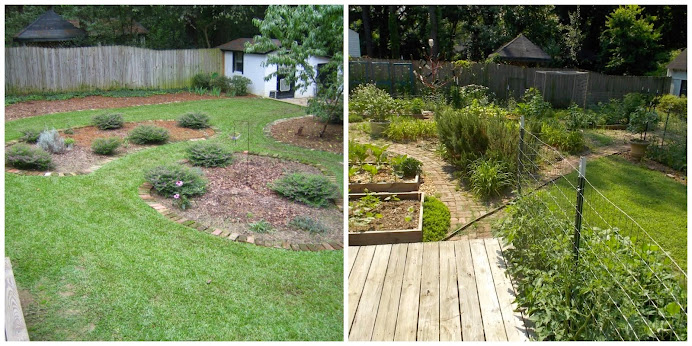Harrisburg was once a mill village in the late 19th and early 20th centuries. But, as the mills closed, the neighborhood fell into decline. And, in recent years it has been a district riddled with crime, drugs, prostitution, and homelessness. Drive down its streets, and you won't fail to see a burnt out shell of a house. Enter a vacant house, and you, more times than not, will find evidence of illegal activity. Convenience stores and fast food restaurants mark the landscape. So, one can't help but wonder how the lack of quality healthy food plays a role in this environment. The U.S.D.A. Economic Research Service considers the Harrisburg-West End Historic District a food desert. It is considered low income and low access as the annual family income is at or below 200 percent of the Federal poverty threshold for family size and the percentage of residents live more than one mile from the nearest supermarket, supercenter, or large grocery store. I live not five minutes from Harrisburg, and yet, not five minutes in the other direction is a collection of grocery stores and thriving economic development. Harrisburg is so close, yet so far.
But, in 2012, some local medical students from the Medical College of Georgia, St. Luke United Methodist Church, and local farmers set about making a change. That change was the Veggie Truck Farmers Market. Augusta Locally Grown was brought on-board to coordinate the farmer's market, and since that time, a small farmer's market has grown into a multi-partner initiative called G.R.O.W. Harrisburg. Its goal is to help residents learn to grow, cook, and eat real food as a community.
Food is the starting point of the initiative, but one of the backbones is community and how important it is for the health and well-being of its residents. I look at my neighborhood as an example. One thing I love about it is my neighbors. They are all good salt-of-the-earth kind of people, and we help each other out. We have each other's phone numbers, and when someone is away for a few days, we tell each other. We watch out for each other. Many of my neighbors have lived in this neighborhood for 40+ years, and they tell me stories about when someone had a goat or how their family had chickens growing up. In my case, farming and food are often conversation starters with someone walking down the street. "You're the house with the chickens, right? I can hear your roosters crowing, and it reminds me of my grandmother's house." or "I love your garden in your front yard. What kind of vegetables are you growing?" or "My grand kids are visiting next week. May I bring them over to see your animals?" So, it's a slippery slope when neighbors no longer know each other and stop taking care of each other. The community bond is broken and the moral integrity follows suit. I can see through my own experiences what makes G.R.O.W. Harrisburg so special. It's the commonality of food and how it is connecting people, and the more neighbor connections you have, the stronger your neighborhood.
Kim Hines, the Executive Director of Augusta Locally Grown, sees the future of Harrisburg, not as a food desert, but as a food destination, where residents and outsiders come to buy local seasonal food and G.R.O.W. Harrisburg as a starting block for micro-businesses. Changing the face of Harrisburg from an outsider's point of view without changing its unique identity and the diversity of its residents is paramount. With the right education and direction, it can happen. I think of Detroit as an example. With the crash of the car industry, Detroit became a barren wasteland. But, local residents are taking it back through food. PBS's Food Forward episode, "Urban Farming," illustrates this brilliantly.
I am so happy to play a small role as a volunteer, and I leave you with a video that perfectly captures the initiative and its programs.
Grow where you're planted,
Candace


